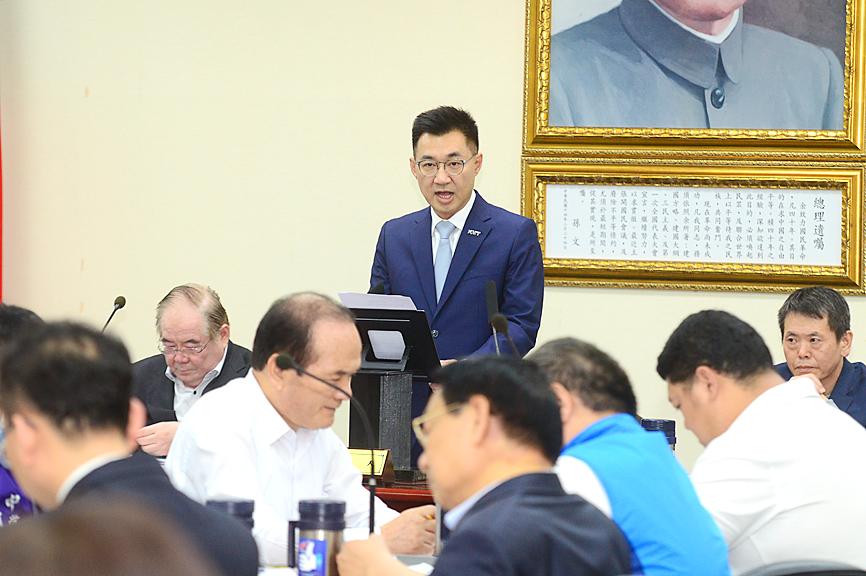Certain Chinese Nationalist Party (KMT) legislators-at-large have seriously tested the party’s image and they could face disciplinary measures or have their nomination retroactively rescinded if their behavior proves to be harmful, KMT Chairman Johnny Chiang (江啟臣) said yesterday at party headquarters in Taipei.
While Chiang did not say who his remarks were directed at, KMT Legislator Wu Sz-huai (吳斯懷) has sparked controversy by saying that five recent Chinese flybys of Taiwan were “not provocative,” urging the Ministry of National Defense not to mislead the public.
Wu earlier this month requested classified Ministry of National Defense data and reportedly received a briefing by military officials in his office.

Photo: Wang Yi-sung, Taipei Times
The data he requested reportedly included material on cyberdefense units at the Information and Electronic Warfare Command, and troop deployments of all three branches of the armed forces, as well as updates on combined service units and military operations.
The words, actions and performance of the KMT’s officials and legislators represent the the party’s brand and values, and are “directly connected” to the party’s image, Chiang said.
As the COVID-19 pandemic continues, the KMT should fulfill its responsibility as an opposition party by working with the government on disease-prevention efforts, supervise the government “rationally” and stand with the public, he said.
“However, the political performance of some legislators-at-large has put the party’s image to the test once again,” he added.
Their performance has not only been criticized by rival parties and questioned by the public, but it has also disappointed supporters of the KMT, Chiang said.
During the party’s nomination process for its at-large candidates last year, all of the nominees signed letters promising that if elected, their words and actions would not harm the party’s image, he said.
The same letter stated that if the nominees were found to have done so, they would submit to disciplinary action and have their nominations revoked in accordance with the party’s regulations, he added.
The letter shows that “regarding the words, actions and quality of its legislators-at-large, the party has the power and duty to restrain and counsel,” Chiang said.
The KMT is at a “critical moment” in its reform efforts, and it can no longer afford for the trust of the public to be eroded, he said.
Chiang said he would ask the party’s reform committee to establish a set of rules for assessing KMT legislators and the results would be used to determine whether a legislator should lose their party membership.
Additional reporting by Sherry Hsiao

Chinese spouse and influencer Guan Guan’s (關關) residency permit has been revoked for repeatedly posting pro-China videos that threaten national security, the National Immigration Agency confirmed today. Guan Guan has said many controversial statements in her videos posted to Douyin (抖音), including “the red flag will soon be painted all over Taiwan” and “Taiwan is an inseparable part of China,” and expressing hope for expedited reunification. The agency last year received multiple reports alleging that Guan Guan had advocated for armed reunification. After verifying the reports, the agency last month issued a notice requiring her to appear and explain her actions. Guan

GIVE AND TAKE: Blood demand continues to rise each year, while fewer young donors are available due to the nation’s falling birthrate, a doctor said Blood donors can redeem points earned from donations to obtain limited edition Formosan black bear travel mugs, the Kaohsiung Blood Center said yesterday, as it announced a goal of stocking 20,000 units of blood prior to the Lunar New Year. The last month of the lunar year is National Blood Donation Month, when local centers seek to stockpile blood for use during the Lunar New Year holiday. The blood demand in southern Taiwan — including Tainan and Kaohsiung, as well as Chiayi, Pingtung, Penghu and Taitung counties — is about 2,000 units per day, the center said. The donation campaign aims to boost

The Kaohsiung Tourism Bureau audited six hotels in an effort to prevent price gouging ahead of Korean band BTS’ concert tour in the city scheduled for Nov. 19, 21 and 22 this year. The bureau on Friday said that the audits — conducted in response to allegations of unfair pricing posted on social media — found no wrongdoing. These establishments included the local branches of Chateau de Chine, Hotel Nikko, My Humble House, and Grand Hai Lai, it said, adding that the Consumer Protection Commission would have penalized price gougers had the accusations been substantiated. The bureau said the Tourism Development Act

BACK TO WINTER: A strong continental cold air mass would move south on Tuesday next week, bringing colder temperatures to northern and central Taiwan A tropical depression east of the Philippines could soon be upgraded to be the first tropical storm of this year, the Central Weather Administration (CWA) said yesterday, adding that the next cold air mass is forecast to arrive on Monday next week. CWA forecaster Cheng Jie-ren (鄭傑仁) said the first tropical depression of this year is over waters east of the Philippines, about 1,867km southeast of Oluanpi (鵝鑾鼻), and could strengthen into Tropical Storm Nokaen by early today. The system is moving slowly from northwest to north, and is expected to remain east of the Philippines with little chance of affecting Taiwan,